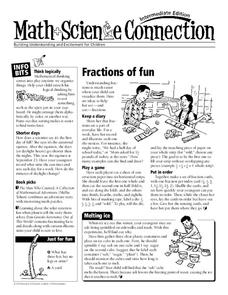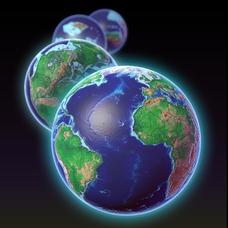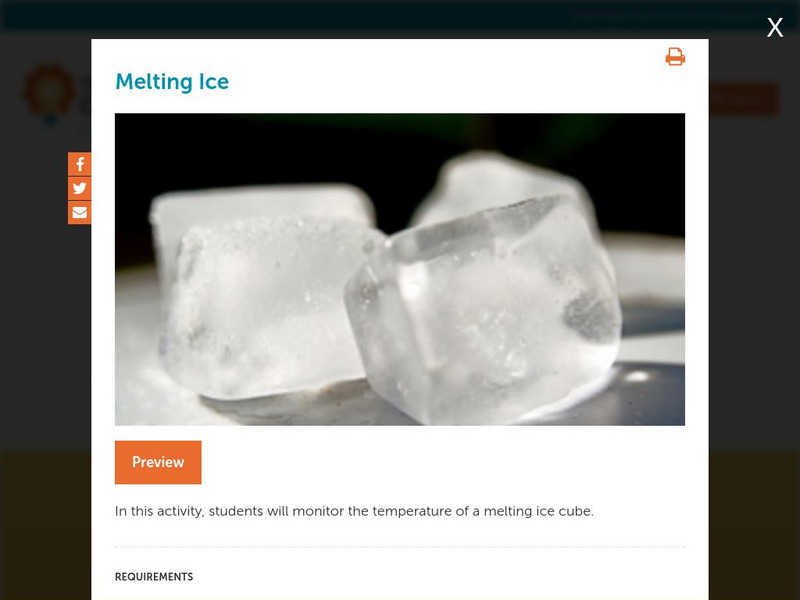Aquarium of the Pacific
States of Matter: Making Ice Cream
Who knew that learning about the states of matter could taste so sweet? This fun hands-on lesson plan captures the attention of learners as they use what they know about solids, liquids, and gases to create their very own batch of ice...
NOAA
Where Have All the Glaciers Gone?
What happens when ice melts? Well ... water happens. When that melting ice is a glacier, the amount of water that results produces change throughout the world. Middle school science sleuths uncover the truth about global...
K5 Learning
Changes
You can't unring a bell, but can you unmelt an ice cube? Readers consider reversible and irreversible changes with a short informational reading passage and accompanying comprehension questions.
Resources for Educators
Fractions of Fun
Reinforce concepts and encourage learner engagement with a collection of math games, science experiments, and cross curricular activities. In one fun resource, learners sort objects, keep a diary of everyday fractions, play a game using...
National Wildlife Federation
The Tide is High, but I’m Holding On… Using ICESat Data to Investigate Sea Level Rise
Based on the rate of melting observed from 2003-2007 in Greenland, it would take less than 10 minutes to fill the Dallas Cowboys' Stadium. The 17th lesson in a series of 21 has scholars use the ICESat data to understand the ice mass...
National Wildlife Federation
Wherefore Art Thou, Albedo?
In the sixth lesson in a series of 21, scholars use NASA data to graph and interpret albedo seasonally and over the course of multiple years. This allows learners to compare albedo trends to changes in sea ice with connections to the...
Columbus City Schools
To Measure its Mass or Volume?
Atoms, elements, and molecules, oh my! Teaching the fundamentals of chemistry to curious sixth graders has never been easier to accomplish. Here is a resource that pulls together everything needed to get them off to a good start,...
K12 Reader
What Glaciers Leave Behind
Glaciers may seem distant and stationary, but they are huge deposits of moving ice that have made changes to the earth's surface. Your pupils can learn about the different types of impressions left by glaciers by reading the short...
Virginia Middle School Engineering Education Initiative
Save the Penguins: An Introduction to Thermodynamics and Heat Transfer
Heat things up in your physical science class with this interactive lesson series on thermodynamics. Through a series of class demonstrations and experiments, young scientists learn how heat is transferred through conduction,...
Center for Learning in Action
Water—Changing States (Part 1)
Here is part one of a two-part lesson in which scholars investigate the changing states of water—liquid, solid, and gas. With grand conversation and up to three demonstrations, learners make predictions about what they think will happen...
Center for Learning in Action
Water – Changing States (Part 2)
Here is part two of a two-part lesson in which scholars investigate the changing states of water—liquid, solid, and gas—and how energy from heat changes its molecules. With grand conversation, two demonstrations, and one hands-on...
Howard Hughes Medical Institute
EarthViewer
Can you imagine Washington DC and London as close neighbors occupying the same continent? Learners will be fascinated as they step back in time and discover the evolution of the earth's continents and oceans from 4.5 billion...
PBS
The Cat in the Hat Activity Exploring Weather
Observe different types of weather right in your classroom! Here, pupils look at clouds, rain, snow, wind, and hot and cold temperatures, and observe these weather patterns at school. They keep track of their observations in a worksheet...
Worksheet Web
Let it Snow
After reading an informational text detailing the ins and outs of snowflakes, scholars draw their own special design then work cooperatively to role play a snowman building scenario.
Center for Learning in Action
Introducing Physical and Chemical Changes
Young scientists investigate chemical and physical changes to the states of matter—gas, liquid, and solid—as well as solutions and suspensions with a variety of demonstrations, grand conversation, and an interactive quiz to check for...
SFPOnline
States of Matter Worksheet
Young scientists get to the heart of the matter as they complete this worksheet on the properties of solids, liquids, and gases.
Have Fun Teaching
When Am I? (16)
How can you tell when a story takes place? Use context clues to infer the time of day and seasons of five short reading passages. Kids then note each passage's time period as daytime or nighttime, as well as winter or summer.
Math Worksheets Land
Multistep Ratio and Percent Word Problems - Matching Worksheet
Increasing and decreasing values happen every day and your learners will be prepared after practicing this worksheet. Show them how ratios are a convenient method to convert between values to get the answer they need. Resource also comes...
K12 Reader
Indefinite Pronouns
Everyone can practice indefinite pronouns with this exercise! Learners complete 14 sentences by filling in the correct indefinite pronoun. A brief definition is provided to assist learners.
Concord Consortium
Concord Consortium: Stem Resources: Melting Ice
Using temperature probes, students will monitor the temperature of melting ice cubes in different situations. This lab activity, allows students to view the procedure and answer questions online that can be saved and evaluated by the...
Other
Antarctic Geological Drilling: What if the Ice Shelves Melted? [Pdf]
An activity guide where students build a model of Antarctica with its ice shelves. They use it to explore the impact of ice shelves melting in the Antarctic, and will discover that frozen ice shelves actually prevent ice further inland...
American Chemical Society
Middle School Chemistry: Changing State: Melting
Discover the concept that energy transfer and molecular motion cause the change in state from a solid to a liquid. Also compare state changes of water to the state changes of other substances.
CK-12 Foundation
Ck 12: Chemistry Simulation: Salty Roads
[Free Registration/Login Required] Explore how solutes can keep roads clear of ice in the winter by learning how different types and concentrations of a solute affect the freezing point of a solution.
Other
Bc Open Textbooks: Physical Geology: Earth's Interior: Isostasy
This textbook excerpt explains the concept of isostasy and the relationship of Earth's crust to the mantle beneath it. This process is compared to the effects of glaciation and describes the effect an ice sheet has on the crust, and the...
Other popular searches
- Ice Cube Melting Experiment
- Ice Melting
- Melting Ice Cubes
- Ice Melting Kindergarten
- Ice Melting Investigation
- Ice Melting and Freezing
- Iceberg Melting Rate
- Ice Melting Point
- Science Lessons Melting Ice
- Science Ice Melting
- Polar Ice Caps Melting
- Ice Melting Data




















![Antarctic Geological Drilling: What if the Ice Shelves Melted? [Pdf] Activity Antarctic Geological Drilling: What if the Ice Shelves Melted? [Pdf] Activity](https://d15y2dacu3jp90.cloudfront.net/images/attachment_defaults/resource/large/FPO-knovation.png)
